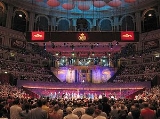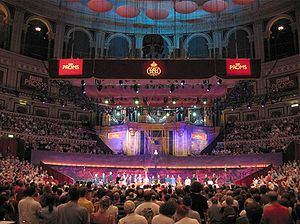
Royal Albert Hall Organ
Encyclopedia

Royal Albert Hall
The Royal Albert Hall is a concert hall situated on the northern edge of the South Kensington area, in the City of Westminster, London, England, best known for holding the annual summer Proms concerts since 1941....
in London
London
London is the capital city of :England and the :United Kingdom, the largest metropolitan area in the United Kingdom, and the largest urban zone in the European Union by most measures. Located on the River Thames, London has been a major settlement for two millennia, its history going back to its...
, is the second largest pipe organ
Pipe organ
The pipe organ is a musical instrument that produces sound by driving pressurized air through pipes selected via a keyboard. Because each organ pipe produces a single pitch, the pipes are provided in sets called ranks, each of which has a common timbre and volume throughout the keyboard compass...
in the United Kingdom. It was originally built by Henry "Father" Willis and most recently rebuilt by Mander Organs
Mander Organs
Mander Organs is an English pipe organ maker and refurbisher based in London. Although well known for many years in the world of organ building, they achieved wider notability in 2004 with their refurbishment of the Royal Albert Hall's Father Willis organ....
, having 147 stops and 9,997 speaking pipes.
The Willis organ
The original organ was built by Henry Willis & SonsHenry Willis & Sons
thumb|250px|St Bees Priory organ, the last major instrument to be personally supervised by "Father" Henry Willis, 1899Henry Willis & Sons is a British firm of pipe organ builders founded in 1845 in Liverpool. Although most of their installations have been in the UK, examples can be found in other...
in 1871. It had four manuals (keyboards
Keyboard instrument
A keyboard instrument is a musical instrument which is played using a musical keyboard. The most common of these is the piano. Other widely used keyboard instruments include organs of various types as well as other mechanical, electromechanical and electronic instruments...
) and 111 stops
Pipe organ
The pipe organ is a musical instrument that produces sound by driving pressurized air through pipes selected via a keyboard. Because each organ pipe produces a single pitch, the pipes are provided in sets called ranks, each of which has a common timbre and volume throughout the keyboard compass...
and was, at that time, the largest in the world.
Harrisons
The Durham firm of Harrison & HarrisonHarrison & Harrison
Harrison & Harrison Ltd are a British company that make and restore pipe organs, based in Durham and established in 1861. They are well known for their work on instruments such as King's College Cambridge, Westminster Abbey and the Royal Festival Hall....
rebuilt the organ in two stages in 1924 and 1933, during which it was increased to 146 stops (including three percussion stops) and converted to electro-pneumatic action
Electro-pneumatic action
The electro-pneumatic action is a control system for pipe organs, whereby air pressure, controlled by an electric current and operated by the keys of an organ console, opens and closes valves within wind chests, allowing the pipes to speak. This system also allows the console to be physically...
. It was still the largest organ in Britain at that time.
In the 1970s, Harrisons refurbished the console and replaced the switchgear in the action, made minor changes to the voicing and added a roof to attempt to project the sound forward, which was not successful. One interesting note in this period is that composer Walter/Wendy Carlos
Wendy Carlos
Wendy Carlos is an American composer and electronic musician. Carlos first came to notice in the late 1960s with recordings made on the Moog synthesizer, then a relatively new and unknown instrument; most notable were LPs of synthesized Bach and the soundtrack for Stanley Kubrick's film A...
featured the organ during the closing title sequence of the 1982 Disney science fiction production Tron
Tron (film)
Tron is a 1982 American science fiction film written and directed by Steven Lisberger, and released by Walt Disney Pictures. It stars Jeff Bridges as the protagonist Kevin Flynn; Bruce Boxleitner in a dual role as security program Tron and Tron's "User", computer programmer Alan Bradley; Cindy...
.
By the end of the 20th century, the organ was again in a state of disrepair, with an ever-increasing number of stops unusable due to leaks in the wind system, cracks in the soundboards, and other problems. By 2002, it was maintained only through "heroic efforts" on the part of Harrisons and could not be used at all without their staff present, in case of mishap. The wind chests and pipes were leaking noisily and wind pressure was insufficient to support full use. The leatherwork in the actions was also failing.
The Mander rebuild
In 2002, the Royal Albert Hall Organ was taken out of commission for an extensive rebuild by Mander OrgansMander Organs
Mander Organs is an English pipe organ maker and refurbisher based in London. Although well known for many years in the world of organ building, they achieved wider notability in 2004 with their refurbishment of the Royal Albert Hall's Father Willis organ....
. Some consideration was given to restoring the organ to its original Father-Willis specification, but the subsequent alterations and enlargements had made this impractical. The organ was by now, in truth, a Harrison, not a Willis, instrument, and it was felt that it should remain essentially as-is.
The dryness of the Hall had damaged the soundboards, so these were replaced and new and larger wind trunks provided. The roof was removed, and the reed stops in the Great division were restored to their 1924 wind pressures. The 1970s split of the Great Organ (allowing two independent Great Organs to be registered and played simultaneously on different manuals) was rationalised, effectively offering separate Willis and Harrison choruses and a Fourniture IV was added, with 147 stops and 9997 speaking pipes.
The organ was re-opened at a gala concert on the evening of 26 June 2004 with David Briggs, John Scott
John Scott (organist)
John Gavin Scott LVO is an English-born organist and choirmaster. He directed the Choir of St. Paul's Cathedral in London from 1990 to 2004. He now directs the Choir of Men and Boys of Saint Thomas Church on 53rd Street and Fifth Avenue in New York City...
and Thomas Trotter
Thomas Trotter
Thomas Trotter is a British concert organist. He is Birmingham City Organist and organist of St. Margaret's, Westminster and visiting Professor of Organ at the Royal College of Music, London....
playing, with the Royal Philharmonic Orchestra
Royal Philharmonic Orchestra
The Royal Philharmonic Orchestra is a British orchestra based in London. It tours widely, and is sometimes referred to as "Britain's national orchestra"...
under Richard Hickox
Richard Hickox
Richard Sidney Hickox CBE was an English conductor of choral, orchestral and operatic music.-Early life:Hickox was born in Stokenchurch in Buckinghamshire into a musical family...
. The organ featured prominently in the 2004 BBC Proms series. The first recordings on the newly rebuilt instrument were by Dame Gillian Weir
Gillian Weir
Dame Gillian Constance Weir DBE is a New Zealand organist.-Biography:Gillian Weir was a co-winner of the Auckland Star Piano Competition at 19, playing Mozart. A year later she won a scholarship of the Associated Board of the Royal Schools of Music in London...
.
In December 2007, Liverpool Anglican Cathedral regained the title of largest pipe organ in the UK with the addition of several stops creating a 'central organ' (now with 10,268 pipes). The instrument has also been used by progressive rock
Progressive rock
Progressive rock is a subgenre of rock music that developed in the late 1960s and early 1970s as part of a "mostly British attempt to elevate rock music to new levels of artistic credibility." John Covach, in Contemporary Music Review, says that many thought it would not just "succeed the pop of...
band Muse
Muse (band)
Muse are an English alternative rock band from Teignmouth, Devon, formed in 1994. The band consists of school friends Matthew Bellamy , Christopher Wolstenholme and Dominic Howard...
when playing Megalomania, originally recorded on another Willis organ, at the church of Saint Mary in Bathwick. During a live performance at the Royal Albert Hall on the 12 April 2008, Muse's frontman, Matt Bellamy, had commented that "since we're here, it would be rude not to play this beast".
Stoplist since 2004
|
|
|
- Couplers: I Choir to Pedal, II Great to Pedal, III Swell to Pedal, IV Solo to Pedal, V Choir (unenclosed) on Solo, VII Octave Orchestral, VIII Sub Octave Second Division (Orchestral), IX Unison off, X Swell to Choir, XI Solo to Choir, XII Reeds on Choir, XIII Great Second Division on Choir, XIV Choir to Great, XV Swell to Great, XVI Solo to Great, XVIII Octave (16′, 8′, 4′ stops only), XIX Solo to Swell, XXI Octave, XXII Sub Octave, XXIII Unison off, XXIV Octave Bombard (16′, 8′, 4′ stops only), XXV Bombard on Choir, XXVI Tubas on Choir.
Annotations
External links
- The organ rebuild as described by Mander Organs
- The Grand Organ of The Royal Albert Hall by Gillian WeirGillian WeirDame Gillian Constance Weir DBE is a New Zealand organist.-Biography:Gillian Weir was a co-winner of the Auckland Star Piano Competition at 19, playing Mozart. A year later she won a scholarship of the Associated Board of the Royal Schools of Music in London...
- Henry Willis & Sons Ltd. Organ Builders (United Kingdom)

